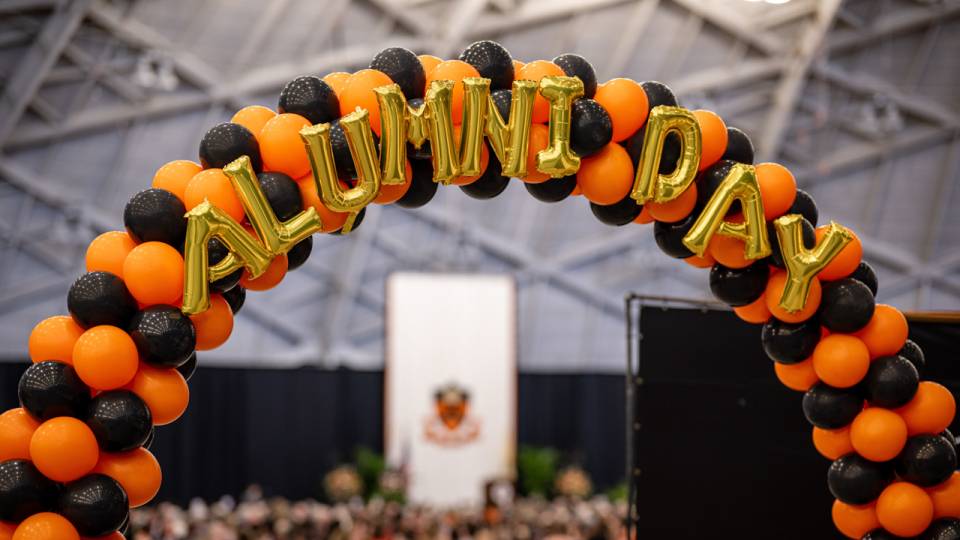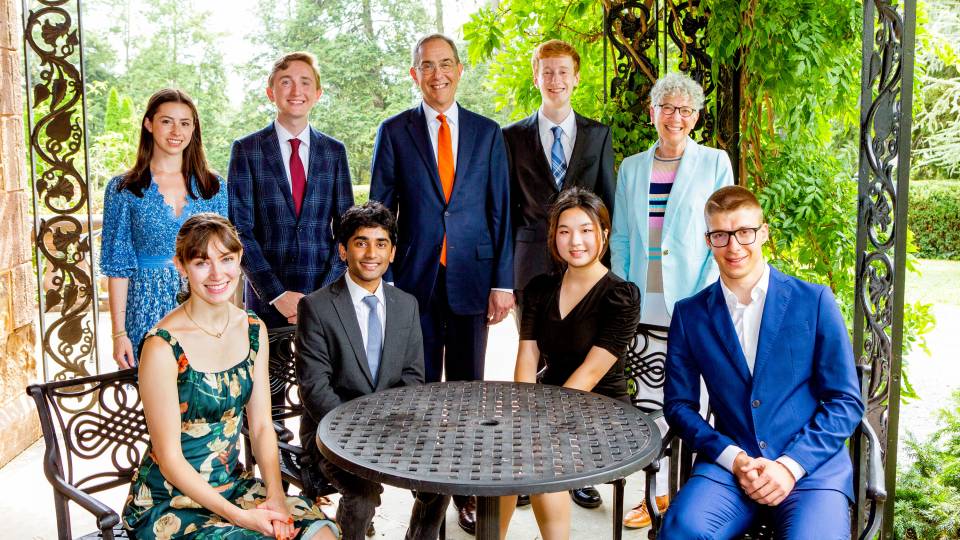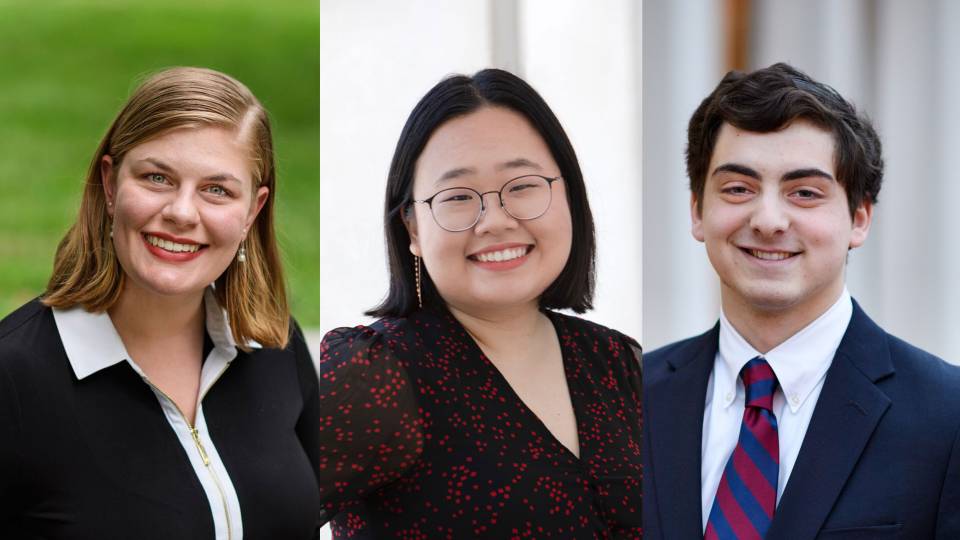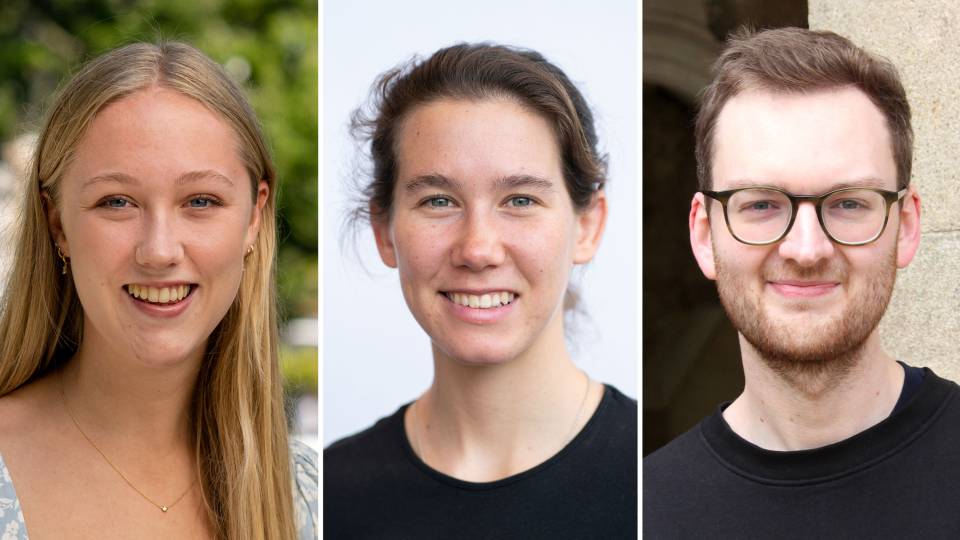Princeton University seniors Casey Beidel and Brian Sheng-Kai Li are the recipients of the 2024 Moses Taylor Pyne Honor Prize, the highest general distinction conferred on an undergraduate. They will be recognized at Alumni Day on campus Saturday, Feb. 24.
The Pyne Honor Prize, established in 1921, is awarded to the senior who has most clearly manifested excellent scholarship, strength of character and effective leadership. Previous recipients include U.S. Supreme Court Justice Sonia Sotomayor and the late Princeton President Emeritus Robert F. Goheen.
Casey Beidel
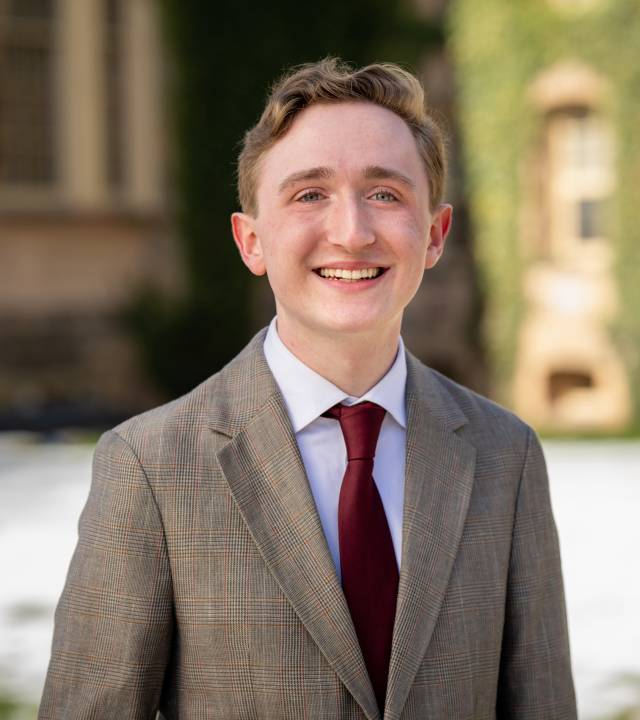
Casey Beidel
Beidel is a sociology major from Rutherford, New Jersey, pursuing certificates in American studies, music theater, and gender and sexuality studies.
He is a two-time recipient of the Shapiro Prize for Academic Excellence, winner of the George B. Wood Sophomore Legacy Prize and three-time winner of the Music Theater Award for Outstanding Contribution given by the Lewis Center for the Arts.
Beidel has devoted much of his time inside and outside the classroom to his dual passions: advocating for LGBTQ+ rights and music and theater performance.
“Princeton has provided me with countless opportunities,” Beidel said. “From aiming to effect change for the LGBTQ+ community as an intern at the Human Rights Campaign through Princeton Internships in Civic Service (PICS), to taking ‘Advanced Fiction’ with one of my literary idols, Joyce Carol Oates, to touring the globe with my a cappella group, the Nassoons, I have cherished every step of my Princeton journey as it’s shaped me as a student, advocate and person.”
Last summer, Beidel supported the Human Rights Campaign’s efforts to end discrimination against the LGBTQ+ community by working on the organization’s Youth Well-Being Program. He previously interned at New Door Ventures in San Francisco, working to extend educational and employment opportunities to disconnected youth.
On campus, he was a research assistant for Princeton’s Human Diversity Lab, supporting the lab’s national study on transgender youth.
“Casey does things not because they are a pathway to something else, but because they are an end in themselves. In concrete terms, he takes on activities where he believes he can be of service to others, and where those activities will bring him joy and meaning,” said Jennifer Jennings, professor of sociology and public affairs. “The strength of his commitment to the issue of educational justice for young people, especially LGBTQ+ youth, is seen in the consistency through which he has followed it in his academic and extracurricular work.”
Beidel’s senior thesis is titled “Don’t Say Gay: A Study of Gender, Sexuality and Freedoms in the Classroom.” He is studying how K-12 educators in New Jersey and Pennsylvania respond to policies that attempt to limit topics related to gender and sexuality, surveying how the policies affect classroom curricula as well as teachers’ interpersonal relations with students.
“I am simply blown away by how intellectually hungry Casey is, and how far he’s willing to push himself to answer questions that matter in a creative, rigorous way,” said Jennings, who is also Beidel’s senior thesis adviser. “As a senior, Casey is already operating at a level we expect of our very best doctoral students in sociology.”
Timothy Nelson, a lecturer in the School of Public and International Affairs, met Beidel teaching the course “Sociology of Religion” and served as his junior paper adviser.
“One thing that impressed me about Casey from the beginning was his seriousness of purpose and inquiring mind,” Nelson wrote in a letter of recommendation. “Casey is one to relish the opportunity to pursue a question that is of interest to him, and will leave no stone unturned in his pursuit of the answer.”
After graduation, Beidel said he hopes to attend law school to work on civil rights issues, particularly those related to LGBTQ+ equality.
Beidel served as president and business manager of the Princeton Nassoons, the University’s oldest student a cappella group. He also has been a Princeton University Triangle Club performer since 2020. In summer 2021, he interned for the New York Foundation for the Arts.
As part of his independent work in music theater, he will perform this spring in an updated portrayal of the production “She Loves Me” at the Lewis Center for the Arts.
In addition, he is a head writing fellow at The Writing Center and previously served as a peer academic adviser at Mathey College. He also is a tour guide for Orange Key.
“Walking around campus still feels surreal to me; I never expected that I’d be able to attend an institution like Princeton, let alone be recognized for my contributions to the campus community with the Pyne Prize,” Beidel said. “On my campus tours, I always tell prospective students and their families how I’ve been amazed and, at times, intimidated, by the vast array of accolades, experiences, and viewpoints of my peers and professors.”
He added: “Ultimately, none of the things I’ve accomplished as a Princeton have been done alone. I’m indebted to the professors who supervised my research and supported me through office hours and assignments, the students with whom I’ve studied, performed and worked, and my family for always believing in me.”
Brian Sheng-Kai Li
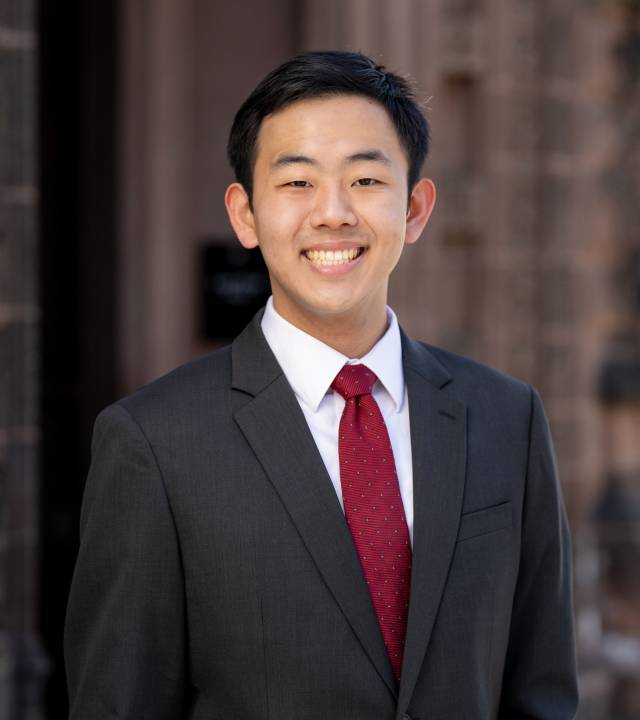
Brian Sheng-Kai Li
Li, of Basking Ridge, New Jersey, is majoring in comparative literature and pursuing a certificate in global health and health policy.
He is a recipient of the Shapiro Prize for Academic Excellence, the Class of 1939 Princeton Scholar Award and the Department of Comparative Literature’s Junior Paper Prize, among other awards.
Li said he was lost for words upon learning he had received the Pyne Prize.
“I’m the son of new Americans who came to this country just under 40 years ago to further their education,” Li said, noting his family’s roots in Hong Kong, Shanghai and Tianjin. "I am ever grateful to the many wonderful teachers that I’ve had over the years who have helped me define and refine my path to and through Princeton.”
He continued: “I use the word ‘teacher’ broadly; they are as much faculty as they are family, friends, classmates, or even serendipitously encountered strangers. They are what the Pyne Prize is all about — a celebration of the faith that these people put in me, a scrappy little Jersey boy.”
Jennifer Rampling, associate professor of history, called Li “an ambassador for the virtues of a Princeton education.”
“Across the board, Brian is a worthy winner of the Pyne Prize,” Rampling said. “He is a young scholar of great character, enthusiasm, and wit, who embraces even the most puzzling historical sources with delight and curiosity.”
Li said his academic interests lie at the intersection of literature and the history of medicine, in particular, how literary depictions of illness affect perceptions in the popular imagination. After Princeton, he plans to pursue a master’s degree in the history of science and medicine and later enter a combined M.D./Ph.D. program.
“My ultimate goal is to work as a physician-historian, combining clinical practice with research and teaching in history of medicine,” Li said. “Today’s medicine draws on ideas from diverse historical periods and cultural traditions — these narratives deserve further consideration by us all. Ultimately, building these bridges can help improve how medical institutions engage with people like you and me.”
His senior thesis, “Eating Disorders and Disordered Eating: Strange Diets and the Grotesque in Pre-Modern Chinese and European Literature,” explores how pre-modern Chinese and European societies used eating disorders in folklore and literature as an analogy for larger cultural and political topics.
“A true interdisciplinary scholar, Brian brings the same level of excellence to literature and history as to science — able to draw with speed and fluency on fields as diverse as Classical Chinese literature, Italian Renaissance glasswork and the modern reconstruction of historical experiments,” Rampling said.
Li is a co-author on a string of peer-reviewed publications in the medical and life sciences, which Rampling noted is an exceptional accomplishment for an undergraduate.
Marina Brownlee, the Robert Schirmer Professor of Spanish and Portuguese and Comparative Literature, said Li excels as a scholar in the field of medical humanities. She said she quickly recognized “how special his intellect, analytical skills, and drive are.”
“In fact, because of these outstanding qualities I have collaborated with him on designing a pilot course on ‘Medical Humanities.’ Brian combines thoughtful close readings of history and literature with insightful and informed scientific perspectives,” Brownlee said.
Beyond his academic achievements, Li is involved in a number of research, service and athletic activities on campus.
Li is a research assistant in the laboratory of Professor of Chemistry Mohammad Seyedsayamdost and conducts research for the University of Pennsylvania Health System’s Center for Evidence-based Practice. He spent two summers at the Stanford University Chariot Program, which leads clinical research to improve pediatric care, and was previously a research assistant at the New Jersey Institute of Technology and for the nonprofit organization Evidence Aid.
He is a residential college adviser in Mathey College, where he has spent all four years of his undergraduate career. Li said he considers mentoring his first-year advisees as his proudest Princeton experience.
During the 2022-23 academic year, Li led Princeton’s chapter of Matriculate, a student group that connects high-achieving, lower-income high school students with trained undergraduate advisers.
He has also served as an undergraduate representative on the University’s recent search committee for the next dean of the college and as chief elections manager for the Undergraduate Student Government. Li is vice president of Princeton’s curling team, which earned a silver medal in the national college championship in 2023.
Looking back to the start of his Princeton career in fall 2020, Li marveled that his journey as a student had led to the Pyne Prize.
“When I first logged onto Zoom as a first-year student during the height of the COVID-19 pandemic, I would have never imagined that this was how the far end of my undergraduate journey would look. In the almost four years since, I’ve gained a lot from the University, and I’m proud to have also been able to give back,” Li said.
